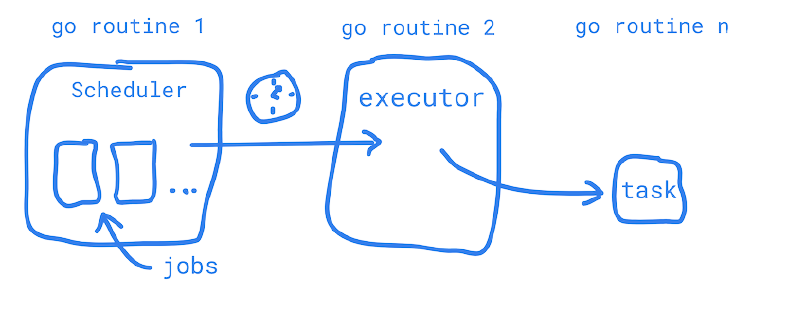
Research
Security News
Malicious npm Package Targets Solana Developers and Hijacks Funds
A malicious npm package targets Solana developers, rerouting funds in 2% of transactions to a hardcoded address.
github.com/go-co-op/gocron
gocron is a job scheduling package which lets you run Go functions at pre-determined intervals using a simple, human-friendly syntax.
gocron is a Golang scheduler implementation similar to the Ruby module clockwork and the Python job scheduling package schedule.
See also these two great articles that were used for design input:
If you want to chat, you can find us at Slack!
s := gocron.NewScheduler(time.UTC)
// Every starts the job immediately and then runs at the
// specified interval
job, err := s.Every(5).Seconds().Do(func(){ ... })
if err != nil {
// handle the error related to setting up the job
}
// to wait for the interval to pass before running the first job
// use WaitForSchedule or WaitForScheduleAll
s.Every(5).Second().WaitForSchedule().Do(func(){ ... })
s.WaitForScheduleAll()
s.Every(5).Second().Do(func(){ ... }) // waits for schedule
s.Every(5).Second().Do(func(){ ... }) // waits for schedule
// strings parse to duration
s.Every("5m").Do(func(){ ... })
s.Every(5).Days().Do(func(){ ... })
s.Every(1).Month(1, 2, 3).Do(func(){ ... })
// set time
s.Every(1).Day().At("10:30").Do(func(){ ... })
// set multiple times
s.Every(1).Day().At("10:30;08:00").Do(func(){ ... })
s.Every(1).Day().At("10:30").At("08:00").Do(func(){ ... })
// Schedule each last day of the month
s.Every(1).MonthLastDay().Do(func(){ ... })
// Or each last day of every other month
s.Every(2).MonthLastDay().Do(func(){ ... })
// cron expressions supported
s.Cron("*/1 * * * *").Do(task) // every minute
// cron second-level expressions supported
s.CronWithSeconds("*/1 * * * * *").Do(task) // every second
// you can start running the scheduler in two different ways:
// starts the scheduler asynchronously
s.StartAsync()
// starts the scheduler and blocks current execution path
s.StartBlocking()
// stop the running scheduler in two different ways:
// stop the scheduler
s.Stop()
// stop the scheduler and notify the `StartBlocking()` to exit
s.StopBlockingChan()
For more examples, take a look in our go docs
| Interval | Supported schedule options |
|---|---|
| sub-second | StartAt() |
| milliseconds | StartAt() |
| seconds | StartAt() |
| minutes | StartAt() |
| hours | StartAt() |
| days | StartAt(), At() |
| weeks | StartAt(), At(), Weekday() (and all week day named functions) |
| months | StartAt(), At() |
There are several options available to restrict how jobs run:
| Mode | Function | Behavior |
|---|---|---|
| Default | jobs are rescheduled at every interval | |
| Job singleton | SingletonMode() | a long running job will not be rescheduled until the current run is completed |
| Scheduler limit | SetMaxConcurrentJobs() | set a collective maximum number of concurrent jobs running across the scheduler |
| Distributed locking | WithDistributedLocker() | prevents the same job from being run more than once when running multiple instances of the scheduler |
| Distributed elector | WithDistributedElector() | multiple instances exist in a distributed scenario, only the leader instance can run jobs |
go get github.com/go-co-op/gocron-redis-lockJobs may have arbitrary tags added which can be useful when tracking many jobs. The scheduler supports both enforcing tags to be unique and when not unique, running all jobs with a given tag.
s := gocron.NewScheduler(time.UTC)
s.TagsUnique()
_, _ = s.Every(1).Week().Tag("foo").Do(task)
_, err := s.Every(1).Week().Tag("foo").Do(task)
// error!!!
s := gocron.NewScheduler(time.UTC)
s.Every(2).Day().Tag("tag").At("10:00").Do(task)
s.Every(1).Minute().Tag("tag").Do(task)
s.RunByTag("tag")
// both jobs will run
Q: I'm running multiple pods on a distributed environment. How can I make a job not run once per pod causing duplication?
Q: I've removed my job from the scheduler, but how can I stop a long-running job that has already been triggered?
context.WithCancel().task := func(in string, job gocron.Job) {
fmt.Printf("this job's last run: %s this job's next run: %s\n", job.LastRun(), job.NextRun())
fmt.Printf("in argument is %s\n", in)
ticker := time.NewTicker(100 * time.Millisecond)
defer ticker.Stop()
for {
select {
case <-job.Context().Done():
fmt.Printf("function has been canceled, performing cleanup and exiting gracefully\n")
return
case <-ticker.C:
fmt.Printf("performing a hard job that takes a long time that I want to kill whenever I want\n")
}
}
}
var err error
s := gocron.NewScheduler(time.UTC)
s.SingletonModeAll()
j, err := s.Every(1).Hour().Tag("myJob").DoWithJobDetails(task, "foo")
if err != nil {
log.Fatalln("error scheduling job", err)
}
s.StartAsync()
// Simulate some more work
time.Sleep(time.Second)
// I want to stop the job, together with the underlying goroutine
fmt.Printf("now I want to kill the job\n")
err = s.RemoveByTag("myJob")
if err != nil {
log.Fatalln("error removing job by tag", err)
}
// Wait a bit so that we can see that the job is exiting gracefully
time.Sleep(time.Second)
fmt.Printf("Job: %#v, Error: %#v", j, err)
Looking to contribute? Try to follow these guidelines:

Jetbrains supports this project with GoLand licenses. We appreciate their support for free and open source software!
FAQs
Unknown package
Did you know?

Socket for GitHub automatically highlights issues in each pull request and monitors the health of all your open source dependencies. Discover the contents of your packages and block harmful activity before you install or update your dependencies.

Research
Security News
A malicious npm package targets Solana developers, rerouting funds in 2% of transactions to a hardcoded address.

Security News
Research
Socket researchers have discovered malicious npm packages targeting crypto developers, stealing credentials and wallet data using spyware delivered through typosquats of popular cryptographic libraries.

Security News
Socket's package search now displays weekly downloads for npm packages, helping developers quickly assess popularity and make more informed decisions.